Are you wondering how to get rid of aphids in the garden? These tiny, sap-sucking insects are a gardener’s worst nightmare, leaving the plants stunted, weak and prone to several other diseases. Aphid control in the garden can involve a series of cultural, mechanical, biological and chemical controls.
The most effective ways to get rid of aphids in gardens are: limiting the use of fertilizers, using reflective silver mulches, hosing off with a strong jet of water, & introducing natural predators like ladybugs, parasitic wasps & lacewings. If all else fails, chemical insecticides may be needed.
It’s worth learning what kind of management and prevention techniques are suitable in your garden for effectively controlling aphids. Get rid of aphids before they suck the life out of your garden, quite literally!
How To Get Rid Of Aphids In The Garden
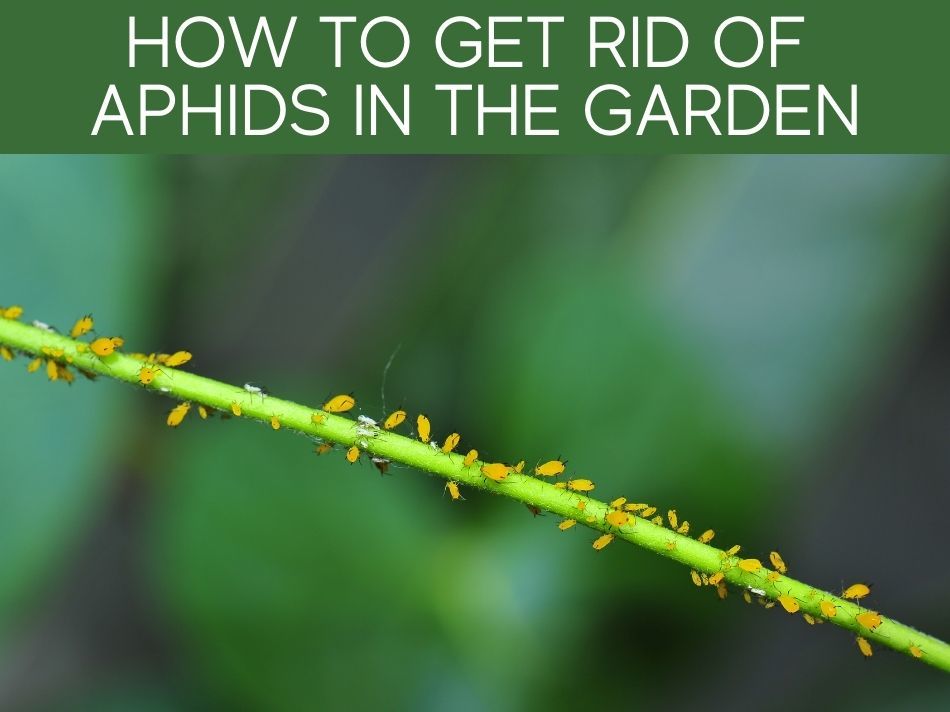
Aphids are a problem in many landscapes.
If not identified and controlled on time, they can create significant damage on many plants.
These tiny insects, white, black, brown, yellow or green in color, are usually found on tender new growth and on the underside of leaves.
Multiple control strategies can be used to drive aphids away from your garden.
Excessive use of nitrogen promotes new growth which tends to attract aphids.
Limit the use of fertilizers, especially nitrogen-based formulas, in the garden to reduce aphid outbreaks.
Smaller infestations, early in the season, can be catered by hosing off the pests with a strong spray of water.
However, since this mechanical control involves some pressure, avoid using it on seedlings and young plants.
Alternatively, you can rub them off the plant with your finger or a wet cloth.
Once they are off the plant, aphids can’t crawl back up and often die of starvation.
Check out our complete article on how to get rid of aphids naturally & organically.
How To Get Rid Of Aphids In Vegetable Garden
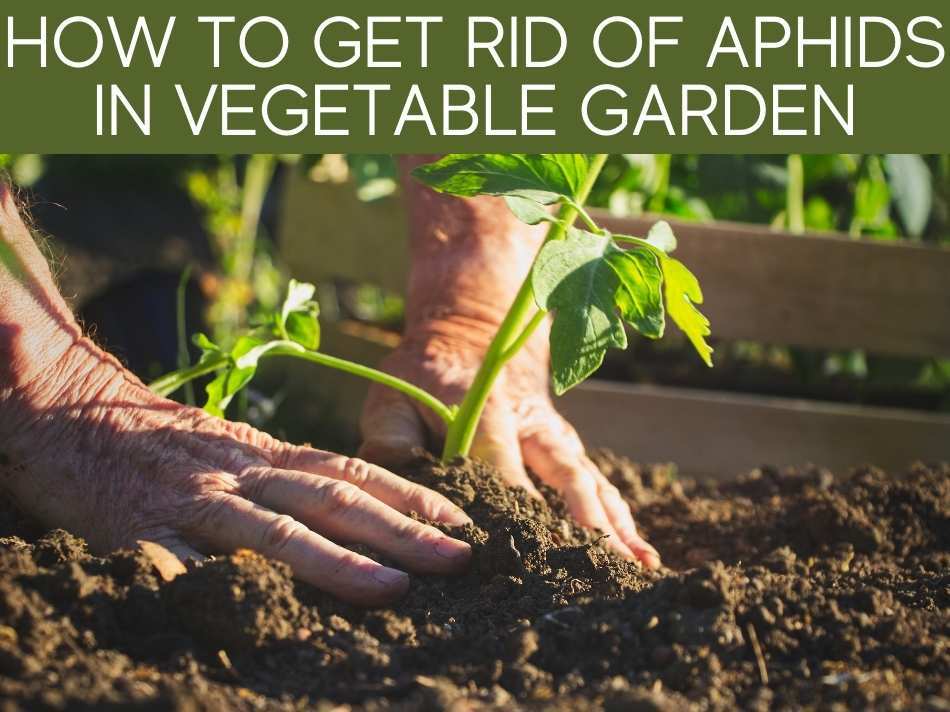
There are several different species of aphids, most of them being wingless.
When population increases, some species can even develop wings to move to other plants to find food and start a new colony.
Take action in time before aphids take over the entire garden, leaving shrivelled, suffering plants everywhere you turn to.
Diatomaceous earth is a non-toxic, organic material that you can use on your vegetable garden to get rid of aphids.
Though the material kills aphids, it is not harmful to humans or pets.
Sprinkle food-grade diatomaceous earth on the plants and over the soil around the plants.
Though it does not affect the plant health, the microscopically sharp edges of the powder scrape through the soft bodies of the insects, killing them eventually.
Be sure to wear a face mask and protective goggles when handling diatomaceous earth since it can irritate the respiratory tract and eyes.
You will have to reapply the powder after it rains since moisture renders it ineffective.
How To Stop Aphids On Vegetables
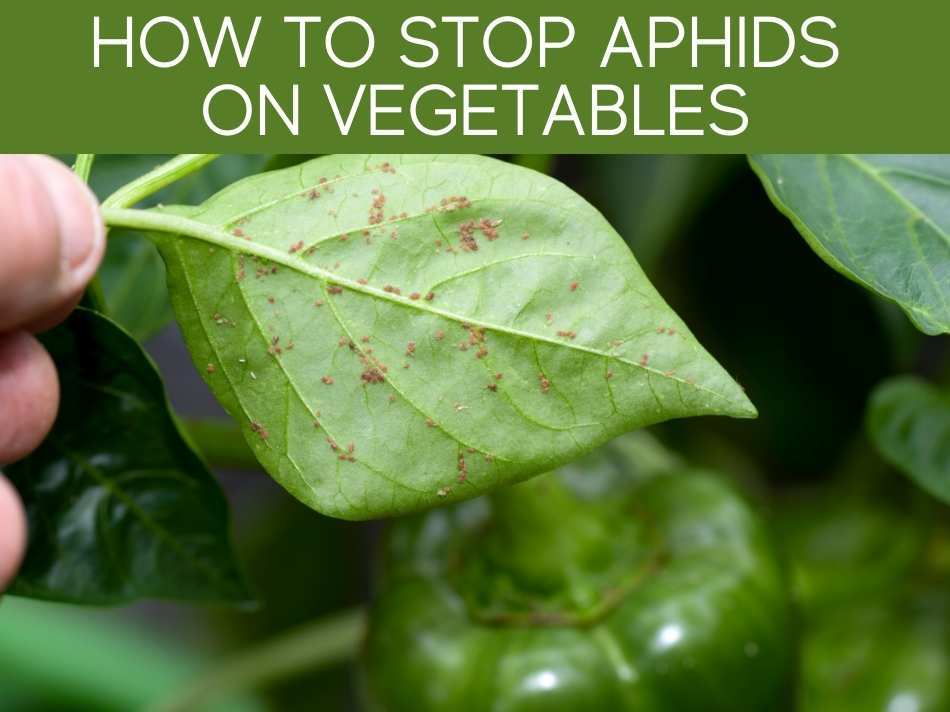
Aphids are especially fond of vegetable crops.
These soft-bodied insects feed on the plants by sucking the nutrient-rich sap out of them. They not only weaken the plants but also harm the flowers and fruits.
If the problem isn’t catered promptly before they start reproducing, yield will suffer significantly.
A traditional remedy against aphids involves dusting the plants with flour.
Flour constipates the aphids, preventing them from sticking around the plants.
Though flour can effectively stop aphids from feeding on vegetable plants, it will have to be reapplied after rain.
Similar to the case with diatomaceous earth, flour is not effective against aphids once it gets wet.
How To Treat Aphids On Vegetable Plants
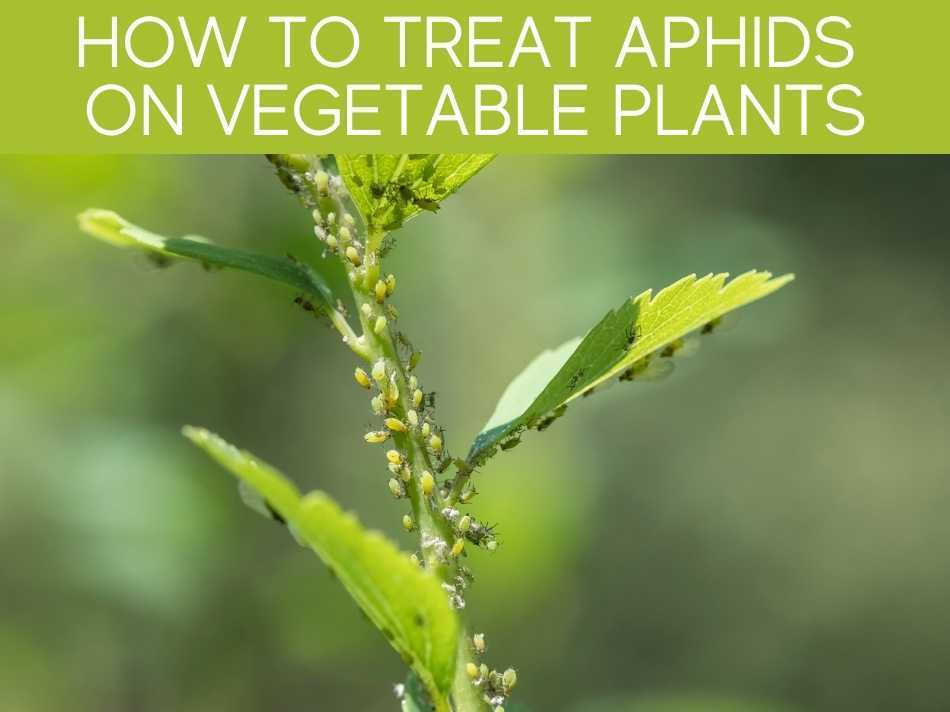
Aphids suck the sap from your vegetable plants and reproduce quickly.
Many generations of aphids may exist in a single growing season if they’re not controlled right away.
There are several ways to combat the pests before any serious damage occurs.
One simple way to treat aphids on vegetable plants is to spray or wipe the foliage with a diluted solution of water and just a few drops of dish soap.
Reapply the solution every 3 days for a period of 2 weeks to see improvement.
Soap coats the bodies of aphids, preventing them from breathing and suffocating them.
The soap solution isn’t just effective on aphids, but a host of other insects too, including spider mites, ants, and whiteflies.
How To Get Rid Of Aphids On Tomatoes
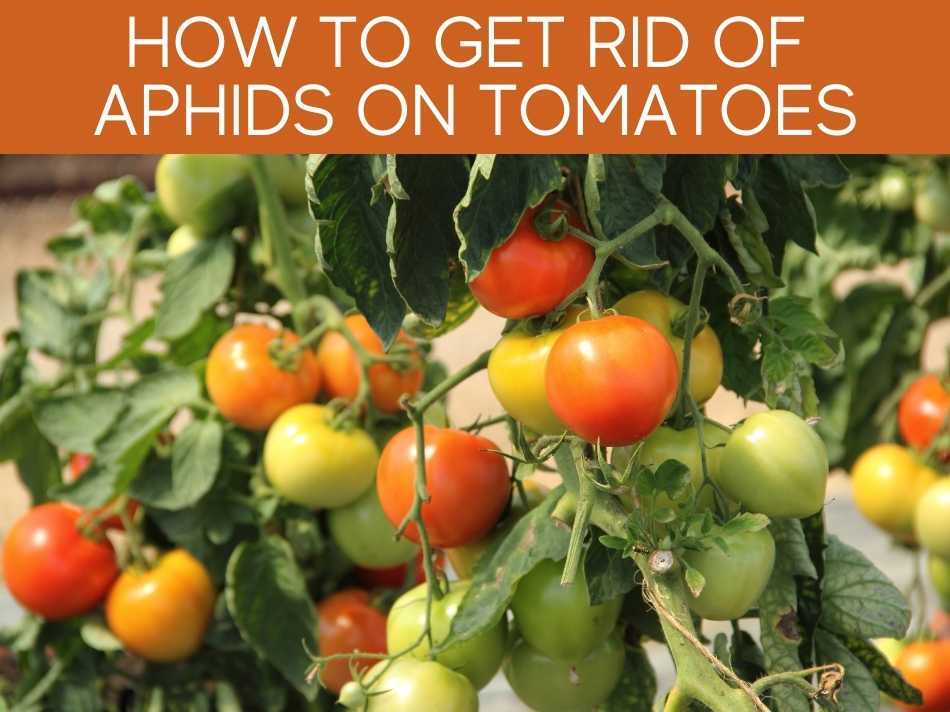
Aphids appear on tomato plants in early spring establishing colonies and feeding on the plants’ saps.
Potato and green peach aphids are particularly common on tomato plants.
Though tomato plants can tolerate a large number of aphids without causing any yield loss, if the infestation is very serious, it can stunt the plants and cause leaves to curl.
Horticultural sprays and insecticidal soaps are all very effective against these soft-bodied insects.
Lemon oil, lime oil, and eucalyptus oil are all good choices to use against aphids.
However since the oil or water droplets can trap heat and sunlight on the leaves, these sprays should be used during the cooler part of the day to prevent any damage to the foliage.
Reapply the spray once each week or after it rains for the treatment to be successful.
Check out the complete guide for growing more tomatoes.
How To Get Rid Of Aphids On Tomato Plants Naturally
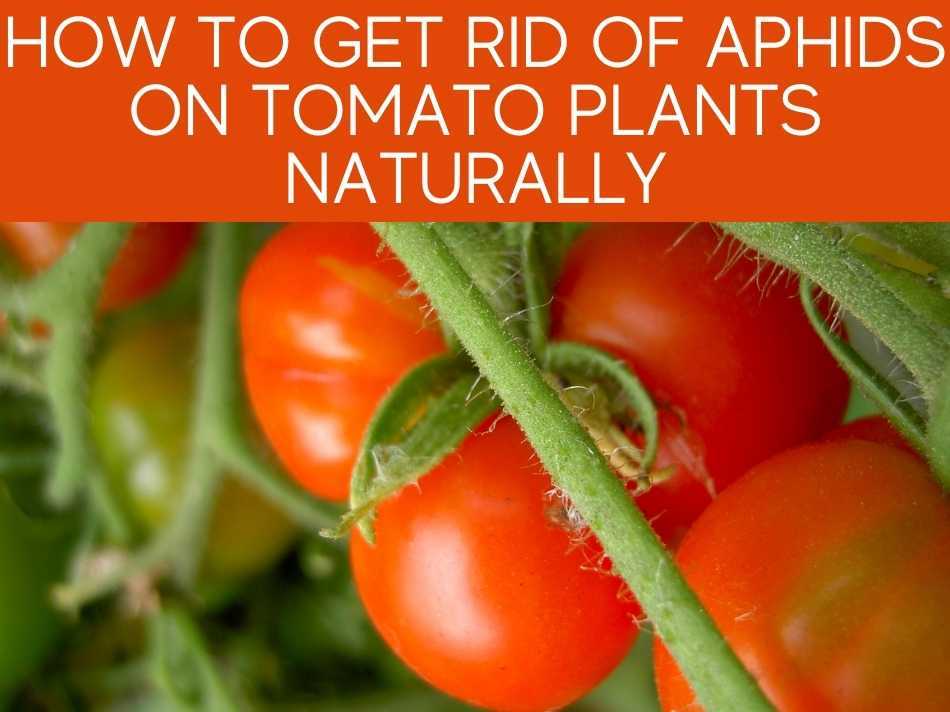
Though organic insecticides are non-toxic to humans and animals, they can kill many beneficial insects too, together with aphids.
This is why chemical control should always be used as the last resort, if all other methods fail.
Fortunately, if you don’t want to use chemicals on your tomatoes, there are several other ways to get rid of aphids on them.
An effective control is to introduce and encourage insects that prey on aphids.
Ladybugs, lacewings, aphid predatory midge, and aphidius wasps prey on aphids.
You can attract and retain natural enemies of aphids in the garden by including plants that produce nectar that these insects feed on.
Queen Anne’s Lace, coneflower, goldenrod, sweet alyssum are some of the plants that attract beneficial insects to the garden.
Ladybugs and lacewings are also available at garden centers to introduce to your garden to control aphids.
You might also want to check out our full article on how to get rid of slugs naturally.
How To Get Rid Of Aphids On Cucumbers
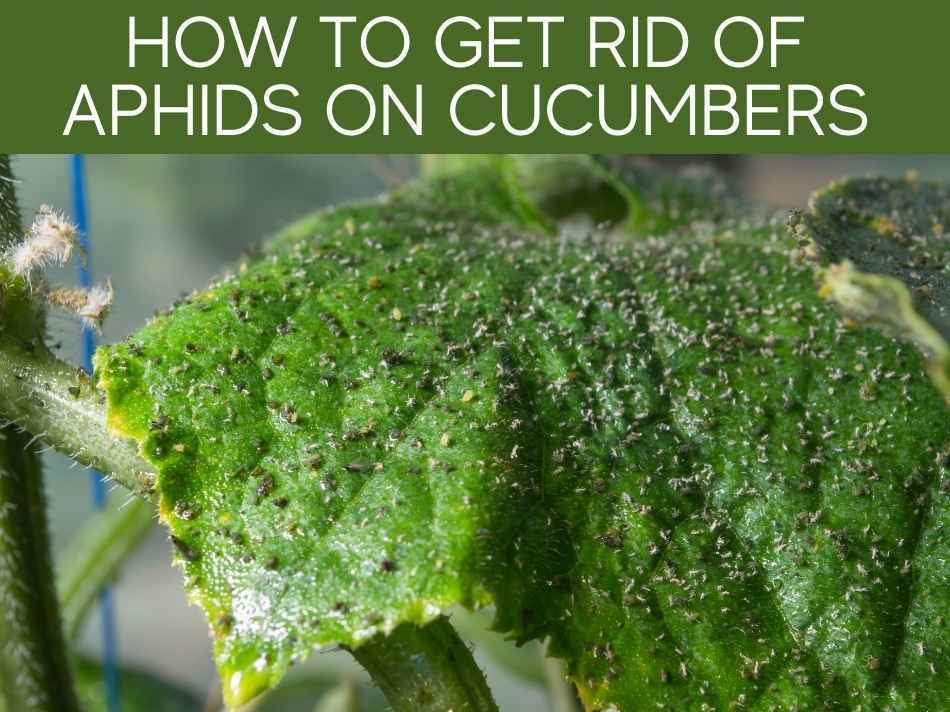
Cucumbers are warm-season vegetables that offer good attraction to aphids to feed on.
Fortunately, aphids are not difficult to control on cucumbers, especially if you spot them early in the season.
Applying neem oil is an effective way to control an aphid infestation on cucumber plants.
The oil coats the bodies of adult aphids and their eggs, causing them to smother and die.
Additionally, the antifungal properties of neem oil help treat the fungal growths such as black sooty mold, that develops as a result of aphids feeding on the plant sap.
Spray the plants with neem oil every other day for about 14 days or until no aphids survive.
How To Get Rid Of Aphids On Pepper Plants
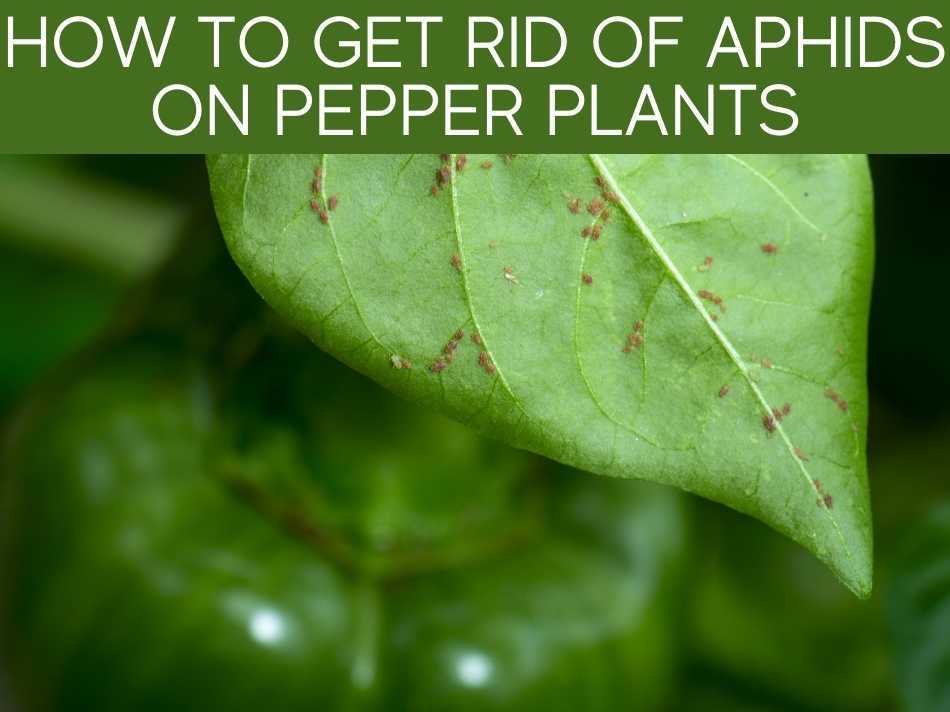
Pepper plants are another one of aphid’s favorite treats growing in many gardens.
Though there are many commercial products to treat aphids on pepper plants, natural insecticides made with some simple household ingredients give results that are just as good.
You can create an effective homemade aphid spray by mixing 1 tablespoon of vinegar, 1 tablespoon of soap, 1 tablespoon of vegetable oil and 1.5 tablespoon of baking soda in a gallon of water.
Leave it overnight before spraying it on the plants.
Reapply the solution as needed to get rid of the aphids for good.
How To Get Rid Of Aphids On Apple Trees
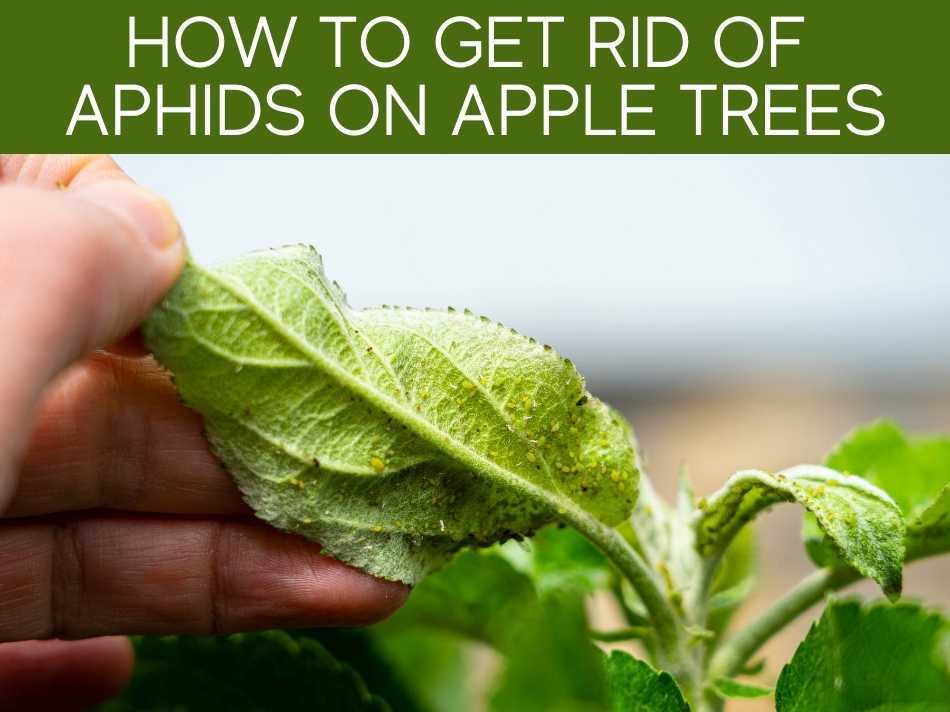
Aphids feed on the sap of apple trees, just as they do on several other plant species.
Other than stunting the new shoots, they also leave the fruit disfigured and unable to mature properly.
Apple grass aphids and green apple aphids are the most common species that attack apple trees.
Though a mature tree can tolerate some aphid damage without showing any effects on yield, serious infestations will need to be catered.
Pyrethrum-based insecticides are effective against aphids and since they break down very quickly, the residual effect is low making the product suitable for organic gardening.
Insecticides based on fatty acids are also effective against aphids on apple trees but they may affect other insects as well.
If there are large infections on a branch or some leaves, it’s worth pruning them out of the tree and destroying them.
How To Get Rid Of Aphids On Lemon Trees
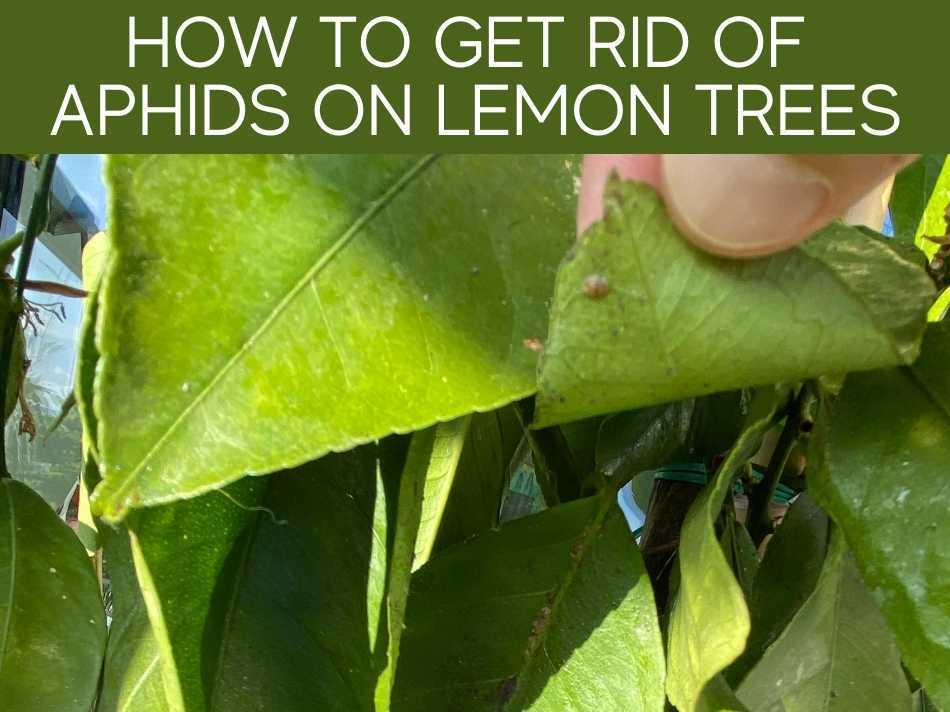
Though aphids are not too problematic on mature citrus trees, they can inflict serious damage on young trees.
Biological control involves using aphid parasites, such as Aphidius and Aphelinus.
If these wasps are introduced and encouraged in the garden, they lay their eggs on the abdomen of aphid nymphs, causing them to appear bloated and bronze in color.
As a result, the aphid population will reduce and your citrus trees will be restored.
How To Get Rid Of Aphids On Basil
Aphids damage the foliage of basil plants, reducing the harvest for the gardener.
Fortunately, there are many ways through which the aphid population can be reduced or completely eliminated to save your future harvests.
Monitor your basil plants timely and hose off any aphids that you spot with a strong jet of water.
Companion planting with aphid repellent plants such as chives, marigold, fennel, garlic and cilantro can also help get rid of aphids from your basil plants.
Plant the aphid-repellent plants in and around the garden that contains all the plants that are attractive to aphids, including basil.
Check out our complete article on how to get rid of aphids on indoor plants.
Conclusion
Aphid control is simpler if you identify the pests and employ the most appropriate techniques earlier in the season.
Use a combination of methods to fight against aphids and get rid of them before they take a toll on your garden.
